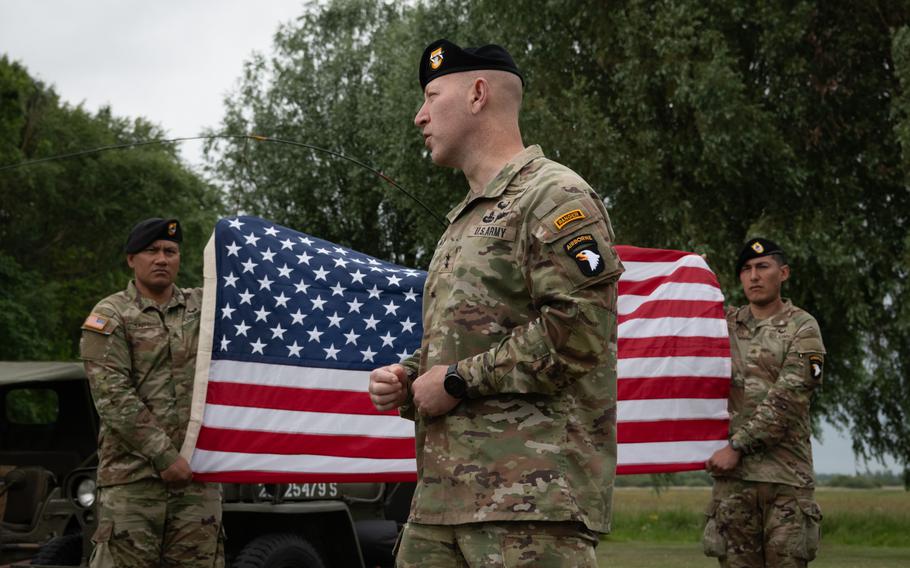
Maj. Gen. David Gardner, commander of the 101st Airborne Division, speaks at a ceremony in Carentan, France, on June 3, 2025, that saw 14 soldiers in the division reenlist. (Phillip Walter Wellman/Stars and Stripes)
CARENTAN, France — In an open 1940s military vehicle rumbling through the Normandy countryside, Staff Sgt. Nathan Selby and Sgt. Juan Ramirez retraced the path of paratroopers who jumped into the nearby fields 81 years ago.
“Imagine them parachuting and falling out of the sky,” Selby shouted.
Ramirez looked up in silence.
The two 101st Airborne Division soldiers were part of a convoy of vintage World War II vehicles weaving through back roads Tuesday near Carentan, where American paratroopers fought just days after the D-Day landings. The ride was part of a battlefield tour aimed at connecting today’s troops with the division’s storied past.
As France prepares to mark the 81st anniversary of the Allied invasion, U.S. military officials say events like this have taken on added meaning. With few World War II veterans still alive, the responsibility to remember and pass on their stories is shifting to a new generation.
About four dozen soldiers from the 101st are in Normandy this week taking part in ceremonies, visiting historic sites and meeting with French citizens whose towns were once battlegrounds.
To deepen that connection, the town of Carentan has hosted battlefield tours in recent years, evolving from bus rides to immersive convoys staffed by volunteers in period uniforms.
For Selby, an infantryman who leads a machine gun team, riding through the terrain where his predecessors fought brought their stories into sharp focus.
“It motivates me to go back and work harder,” Selby said. “If we were in a situation like this, would we be able to accomplish the mission with today’s Army? We have to be able to train our men to that same level.”
He posed the question not long before the convoy drove down Purple Heart Lane, a narrow causeway where 101st paratroopers came under withering German fire.
Nearby, in front of a monument marking Lt. Col. Robert Cole’s famed bayonet charge, Selby and Ramirez joined a group of 14 soldiers who reenlisted, pledging on the very ground where over 100 Screaming Eagles were killed in combat.
“This is very special,” Selby said moments after taking the oath. “Walking in their footsteps … it changes the way you see the job.”
In the early hours of June 6, 1944, members of the 101st Airborne parachuted behind enemy lines.
Despite being scattered across the countryside, they regrouped, seizing key bridges and securing vital roads leading inland from Utah Beach.
Two regiments from the division fought at the banks of the Douve River, where Tuesday’s convoy stopped to hear the stories told by tour organizer Denis van den Brink.
At one drop zone nearby, most of the paratroopers were shot out of the sky by waiting German forces. Only a few survived.
It was a different story at another site on the tour, known as Hell’s Corner. There, 101st soldiers ambushed a battalion of elite German troops, killing around 150 and forcing a surrender.
For Sgt. 1st Class James Pettit, standing on that ground was humbling, but the reception from French citizens moved him just as much.
“Being able to understand the history and to see the compassion, it lights an internal flame and it makes me want to drive harder and take that message back to my younger soldiers and explain to them the love that everyone around us here has for us,” Pettit said.
Some of that gratitude came from about a dozen local high school students, who rode along with the convoy and shared stories, jokes and facts about Normandy.
Before the tour began, they gave a presentation at Carentan’s theater, where they explained everything from regional cheeses to how much it costs to buy a castle. For anyone who might be interested, the answer was 3.5 million euros.
One student highlighted ties between the U.S. and France, noting that about 30% of English words have French roots thanks to the Norman conquest of England — though the soldiers’ pronunciation attempts didn’t quite reflect that.
“This is so rare,” Maj. Gen. David Gardner, commander of the 101st Airborne Division, said of the opportunity his soldiers were getting to interact with French citizens while learning about the unit’s history.
“In my 30-plus years (in the military), I’ve cherished the opportunities I’ve had to meet our veterans of World War II,” Gardner said. “Almost as good is to be on this terrain learning about what our division did and to see and meet the sons and granddaughters, grandsons and great-grandchildren in the places we’re so connected to.”